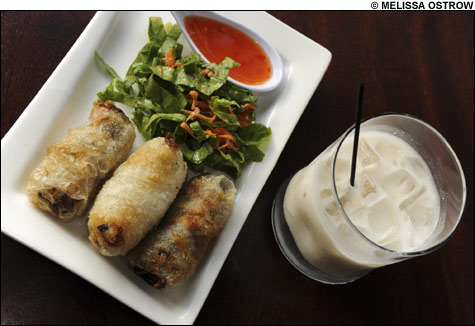
JE T’AIME, NEMS: Nems, the Senegalese version of spring rolls (here featuring finely chopped shrimp, beef, carrots, scallions, and mushrooms), are familiar fried crunchies. |
| Teranga | 1746 Washington Street, Boston | 617.266.0003 | Open Monday–Friday, 11 am–2:30 pm and 5–11 pm; Saturday and Sunday, 10 am–2:30 pm and 5–11 pm | DI, MC, VI | beer and wine | sidewalk-level access | no valet parking |
Teranga is Boston's first serious Senegalese restaurant, but belongs more in the upscale-import category with the Helmand, Lala Rokh, and Orinoco than with typical immigrant restaurants. It's a pleasant and beautifully decorated bistro where diners mingle and have a good time. ("Teranga" denotes a strong concept of hospitality in the Wolof language.) On one evening visit there was a brief neighborhood blackout, during which the restaurant actually got louder without the lights and background music (jazz and salsa, likely African) and patrons exchanged jokes about power outages in Africa. Even early on in the night, people, ethnicities, and continents combined in the friendliest, most wonderful way.Owner Marie-Claude Mendy comes from Dakar, but has lived all over Europe, and her African-art collection, some on display at Teranga, is from everywhere but Senegal. The small room is outfitted with a bar of dark tropical sapele wood, and zebrawood cabinets and accents. You know you are in the South End by the bare brick wall. But the wicker place mats, decorated gourds, and lively crowd can carry you away.
Food starts with some very plain sliced white bread and a dip of oil and spices. This is familiar bistro stuff, but the oil — with caramelized onions, fennel seeds, and hot pepper — is totally original. It's so addictive, I could see building a whole stew around the combination.
Among the appetizers, I favor the Accra ($6), three white patties of cowpeas with the skins rubbed off, like no-spice falafel, but with an orange mayonnaise sauce that packs a kick. Croquettes du Poisson ($7) are rubbery fish cakes somewhat like the Thai Tod Mun, but nicer, and served with a spoon of cilantro chutney. Fataya ($7), a spicier fish mixture in pastry turnovers, is for those who want stronger flavors. Nems ($7), the Senegalese version of spring rolls — more than just broken rice went between former French colonies — are easy and familiar fried crunchies. A Salade Vietnamiene ($7) is like the shredded Vietnamese salads with slightly sweet fish-sauce dressings, but with chewier noodles and strips of seaweed — a nifty switch. Brochette de Crevettes ($8) is an excellent shrimp skewer with real grill taste, and more of that orange mayonnaise.
Senegal's "national dish" is supposed to be Thiébou Djoun ($15), a steak of a solid fish, perhaps king mackerel, with a stuffing of green herbs. It's stewed in tomato sauce with vegetables (cauliflower, cabbage, carrots), and plated over a lot of broken rice pilaf. But the Senegalese dish more people have heard of is Chicken Yassa ($14), here a half Cornish hen or small fryer chicken with aromatic white rice and an onion sauce. Mafe ($14) is a large lamb shank with a similar sauce, couscous, and greens. Even better were Dibi ($17), shoulder lamb chops served with soft sweet-potato fries and greens.
Somewhere between Senegal and Boston bistro, we end up with a product that lots of patrons will view as soul food: Chicken brochettes ($14), two skewers grilled to a turn, marinated in onions and spices (perhaps mustard), then bedded in a peppery slaw.
The obvious beverage choice at Teranga is beer, and the restaurant is shopping for African imports. I've tasted Mamba, from Côte d'Ivoire; Nigerian and Kenyan beers are also supposed to be of high quality. Until those arrive, though, Haiti's Prestige ($5.50) is a surprisingly lively pilsner. Steinlager ($5.50) from New Zealand is another fine choice, as hoppy as early Samuel Adams. For wine, Goodnight chardonnay ($8/glass; $36/bottle), the second label of the Firestone Vineyard in Santa Barbara, pairs well with the milder dishes. A 2006 New Zealand Dashwood sauvignon blanc ($7; $28) is spicier and even more food friendly.
Since most Senegalese are Muslim, Teranga offers unusual fruit drinks, some of which are sweet enough for dessert. My favorite was bouyé juice ($3), the creamy white product of the baobab fruit, mixed with pineapple juice and orange flower water for a subtle sweetness. Ginger juice ($3) was a tall glass of sweet-sour stuff, rather like the Jamaican version. Bissap juice ($3) is also like a Jamaican drink (sorrel), and is made from sour hibiscus flowers, again sweetened with pineapple juice and vanilla sugar.
Desserts were a little spotty on our visit. A promising mango crème brûlée was delayed past our time by the power outage. Beignets ($6), four triangles of fried dough with a vanilla cream sauce, were my favorite. Fried dough is now the universal human food. Thiarry ($6), a rice pudding made from couscous, was too crunchy and not very rich. Chocolate molten cake ($6) was perhaps too molten, while Crème Rosé ($6) was a curdled custard without enough rosewater.
Service was terrific during our visits. Although this point on Washington Street, just off Mass Ave, is not far from Toro, Teranga is really at the crossroads of old and new South End. It could be just the bistro needed to pull it together.
Robert Nadeau can be reached at robtnadeau@aol.com.